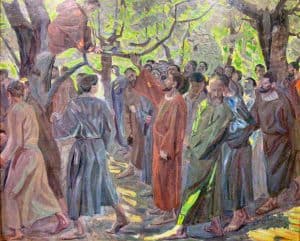A Christmas Bible Study, Meditation, and Reflection
This, this is Christ, the King,
Whom shepherds guard and angels sing:
Haste, haste to bring Him laud,
The Babe, the Son of Mary!
—William Chatterton Dix (1837-1898)—
Key point: God the Father was pleased with, and proud of, His Son — and He told us so. The Lord affirmed and reaffirmed who His Son was and what He came to do. Being confident of who Christ, we eagerly worship Him and share the good news about Him with others.
Within hours after Jesus was born in Bethlehem in a stable because “there was no room” for Mary, Joseph, and the baby “in the inn,” shepherds who were “staying out in the fields and keeping watch over their flock at night” got the surprise of their lives.

Luke 2 9 [A]n angel of the Lord suddenly stood near them, and the glory of the Lord shone around them; and they were terribly frightened.10 And so the angel said to them, “Do not be afraid; for behold, I bring you good news of great joy which will be for all the people; 11 for today in the city of David there has been born for you a Savior, who is Christ the Lord. 12 And this will be a sign for you: you will find a baby wrapped in cloths and lying in a manger.” 13 And suddenly there appeared with the angel a multitude of the heavenly army of angels praising God and saying,
14 “Glory to God in the highest,
And on earth peace among people with whom He is pleased.”

For reflection and discussion: How did the shepherds respond? See Luke 2:15-20. Would your response have been any different from theirs? If so, how?
Luke 2 15 When the angels had departed from them into heaven, the shepherds began saying to one another, “Let’s go straight to Bethlehem, then, and see this thing that has happened, which the Lord has made known to us.” 16 And they came in a hurry and found their way to Mary and Joseph, and the baby as He lay in the manger.17 When they had seen Him, they made known the statement which had been told them about this Child. 18 And all who heard it were amazed about the things which were told them by the shepherds. 19 But Mary treasured all these things, pondering them in her heart. 20 And the shepherds went back, glorifying and praising God for all that they had heard and seen, just as had been told them.
Making Haste Means More than Acting Quickly
I want to highlight an item in this passage we tend to miss, and then another, and then talk about how the two fit together. At first these two insights might appear unrelated, but they are not.
First, the shepherds “came in a hurry” to Bethlehem “and found their way to Mary and Joseph, and the baby as He lay in a manger” (v. 16). The word translated “in a hurry” in the New American Standard Bible and “with haste” in the King James Version means, of course, “acting or moving quickly”; but carries another meaning as well: “to desire earnestly.” We can sense both of these elements in another passage from Luke. In chapter 19, the physician and author of this Gospel records Jesus’ encounter with Zacchaeus, a notorious and hated tax collector. Responding to Jesus as did the shepherds decades before Zacchaeus also “made haste.”

Luke 19 1Jesus entered Jericho and was passing through. 2 And there was a man called by the name of Zaccheus; he was a chief tax collector and he was rich. 3 Zaccheus was trying to see who Jesus was, and he was unable due to the crowd, because he was short in stature. 4 So he ran on ahead and climbed up a sycamore tree in order to see Him, because He was about to pass through that way. 5 And when Jesus came to the place, He looked up and said to him, “Zaccheus, hurry and come down, for today I must stay at your house.” 6 And he hurried and came down, and received Him joyfully.7 When the people saw this, they all began to complain, saying, “He has gone in to be the guest of a man who is a sinner!” 8 But Zaccheus stopped and said to the Lord, “Behold, Lord, half of my possessions I am giving to the poor, and if I have extorted anything from anyone, I am giving back four times as much.” 9 And Jesus said to him, “Today salvation has come to this house, because he, too, is a son of Abraham. 10 For the Son of Man has come to seek and to save that which was lost.”
For reflection and discussion: How do earnestly desiring something and acting quickly fit together? Explain why hurrying in some situations isn’t reckless or foolish, but wise. Describe clues that might indicate acting “with haste” in a particular situation is indeed wise. Describe warning signs in other types of situations that might encourage us to slow down.
Points to consider: The shepherds’ response to the angel’s good news was quite natural. Since there was a ton of evidence the news had come from God (for only God can orchestrate a supernatural event like the shepherds had witnessed) the shepherds were right to enthusiastically head off to Bethlehem to investigate for themselves. After all, the angel invited them to do just that! Good news is to be received, celebrated, and shared.
Jesus Is Clearly Identified
The second insight is that the angel identified Jesus for the shepherds, making it much easier for them to find Him. The angel announced the awesome news that
[T]oday in the city of David there has been born for you a Savior, who is Christ the Lord. And this will be a sign for you: you will find a baby wrapped in cloths and lying in a manger (v. 11).

Thus, not only did the angel tell the shepherds who it was that had been born, but also how they could find and identify Him. I can imagine that Jesus might not have been the only baby born that night, but the angel was quite specific: “[Y]ou will find a baby wrapped in cloths and lying in a manger” (v. 12). There would be no way the shepherds wouldn’t know whether or not they’d found the baby for whom they would be looking.
This was not nearly the only time God would identify His Son so people could be confident of who He was and is. This page highlights many instances of God’s pointing Him out. While some of these occurrences were not public announcements or pronouncements initially, all of them became public by virtue of appearing in God’s Word, the Bible. For our purposes here, let’s look at six of these events; on the longer list, we’ll examine item 6, a couple of passages related to item 7, and items 8, 11, 14, and 16.
-
-
- After Jesus was baptized by John, He “came up immediately from the water; and behold, the heavens were opened, and he saw the Spirit of God descending as a dove and settling on Him, and behold, a voice from the heavens said, ‘This is My beloved Son, with whom I am well pleased’” (Matt. 3:16-17).
- In John 5:39-40, Jesus challenged the Jews who opposed Him, saying, “You examine the Scriptures because you think that in them you have eternal life; and it is those very Scriptures that testify about Me; and yet you are unwilling to come to Me so that you may have life.” Also, in John 14:6 Jesus declared, “I am the way, and the truth, and the life; no one comes to the Father except through Me.” If Jesus was wrong, He either was lying or was mistaken, but He certainly wouldn’t have been a great teacher. If He was correct, then not only was He a great teacher but also God in the flesh and the only way to God. The point here is that with His own words, Jesus identified Himself as God.
- When Jesus was transfigured in the presence of Peter, James, and John, He appeared “the appearance of His face became different, and His clothing became white and gleaming. And behold, two men were talking with Him; and they were Moses and Elijah” (Luke 9:29-30). The disciples were obviously overcome, and Peter suggested building “three tabernacles,” one apiece. Peter hadn’t known what to say, and the disciples grew afraid. At that point “a cloud formed, overshadowing them, and a voice came out of the cloud: ‘This is My beloved Son; listen to Him!’ And suddenly they looked around and saw no one with them anymore, except Jesus alone” (Mark 9:7-8).
- In His sermon at Pentecost, Peter declared, “Therefore let all the house of Israel know for certain that God has made Him both Lord and Christ—this Jesus whom you crucified” (Acts 2:36).
- After meeting Jesus on the road to Damascus and becoming His follower, Saul “immediately…began to proclaim Jesus in the synagogues, saying, ‘He is the Son of God.’ All those hearing him continued to be amazed, and were saying, ‘Is this not the one who in Jerusalem destroyed those who called on this name, and had come here for the purpose of bringing them bound before the chief priests?’ But Saul kept increasing in strength and confounding Jews who lived in Damascus by proving that this Jesus is the Christ” (Acts 9:20-22).
- The apostle John would identify Jesus clearly at the very beginning of his first epistle, in what we now know as 1 John 1. John wrote in part, “What was from the beginning, what we have heard, what we have seen with our eyes, what we have looked at and touched with our hands, concerning the Word of Life— and the life was revealed, and we have seen and testify and proclaim to you the eternal life, which was with the Father and was revealed to us— what we have seen and heard we proclaim to you also, so that you too may have fellowship with us; and indeed our fellowship is with the Father, and with His Son Jesus Christ. These things we write, so that our joy may be made complete.” (vv. 1-4).
-
All of these Bible passages are available here. A PDF file of the above numbered list is available here.
Observations
First, just as the Lord revealed to the shepherds through His angel who Jesus was and how they could find and identify Him, so also did the Lord repeatedly identify Him in the course of Jesus’ life and ministry. God wants people to accurately identify His Son. He wants them to know about Him, yes; but He also wants people everywhere to know Him. God has gone out of His way to eliminate confusion about who Jesus is.
Second, God revealed the identity of His Son to specific people who, in turn, shared this important information with others. We are reminded of Paul’s admonition to Timothy in 2 Timothy 2:2: “The things which you have heard from me in the presence of many witnesses, entrust these to faithful people who will be able to teach others also.” Certainly, the identity God’s only Son is one of Christianity’s foundational teachings.
Third, encounters with Jesus are personal, not theoretical or strictly academic. Yes, they make sense and are reasonable, but they involve interacting with the one true God. After they went to the stable and found Jesus, the shepherds “went back, glorifying and praising God for all that they had heard and seen, just as had been told them” (Luke 2:20, emphases added). In John 1, John wrote about “what we have heard, what we have seen with our eyes, what we have looked at and touched with our hands, concerning the Word of Life” — that “life was revealed, and we have seen and testify and proclaim to you the eternal life, which was with the Father and was revealed to us” (1 John 1:1-2, emphases added).

Fourth, if we are open to receiving the truth about who Jesus is, if we want to know Him and are willing to search for Him earnestly, just as the shepherds, Zacchaeus, and others did, we will find Him. As God told His people in Jeremiah 29:13, “And you will seek Me and find Me when you search for Me with all your heart.”
We certainly ought to marvel over who Jesus is and all He has done for us, but we need not wonder about these things. We have a confidence that truly is out of this world. We know who Jesus is, and we know what He has done for us because God has revealed these truths to us!

Fifth, we have a responsibility to tell others who Jesus is and what He came to do, just as others told us — and just as the shepherds shared the good news about Jesus after returning to their fields from Bethlehem. They would never again be the same.
These five observations are available in a PDF file here.
We Earnestly Seek Him Because We Know Who He Is
Do you see the connection now? Knowing who Jesus is, we cannot help but seek Him earnestly, or, as the King James Version of the Bible puts it, “with haste.”
No wonder Christmas offers “good news of great joy…for all the people.” Actually, I can’t think of any news that could be better than this!
Can you?
Copyright © 2021 by B. Nathaniel Sullivan. All rights reserved.
Unless otherwise indicated, Scripture passages have been taken from the NEW AMERICAN STANDARD BIBLE®, Copyright © 1960, 1962, 1963, 1968, 1971, 1972, 1973, 1975, 1977, 1995 by The Lockman Foundation. Used by permission.
top image credit: Lightstock
